Law of Commerce Assignment: Contract Law Analysis & Application
VerifiedAdded on 2023/01/05
|6
|1492
|74
Case Study
AI Summary
This Law of Commerce case study analyzes a contract dispute involving Arthur and BuildCon. The issues revolve around the validity of the contract given delays in obtaining necessary permissions and BuildCon's entitlement to full payment. The analysis applies contract law principles, including offer, acceptance, consideration, and intention to create legal relations. The case examines the concept of anticipatory breach and its implications, referencing relevant case law such as Hochster v De la Tour. The study concludes that BuildCon's breach is justified due to Arthur's failure to secure timely permissions, and BuildCon is entitled to the additional payment for early completion, making Arthur liable for damages if payment is withheld. Desklib provides access to similar solved assignments for students.
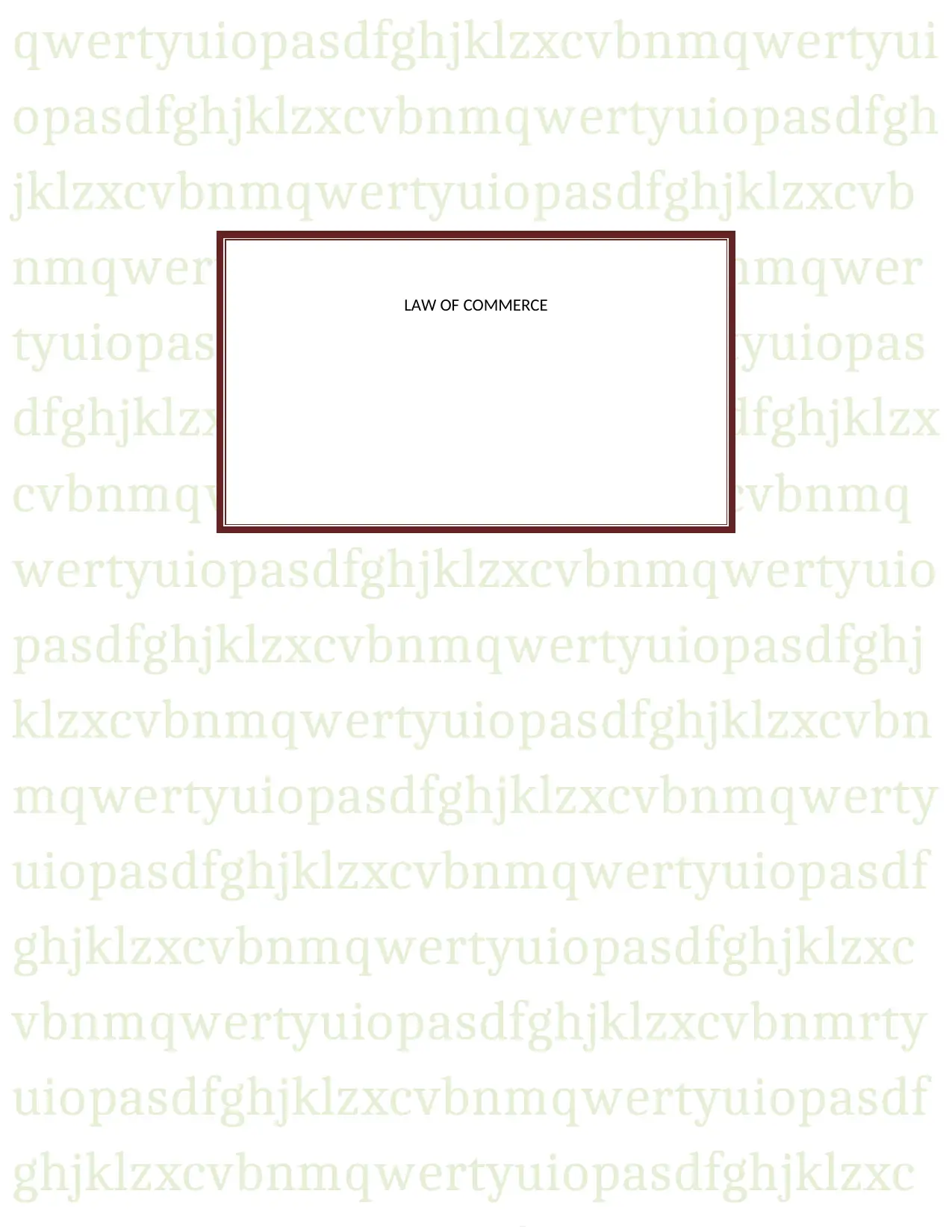
qwertyuiopasdfghjklzxcvbnmqwertyui
opasdfghjklzxcvbnmqwertyuiopasdfgh
jklzxcvbnmqwertyuiopasdfghjklzxcvb
nmqwertyuiopasdfghjklzxcvbnmqwer
tyuiopasdfghjklzxcvbnmqwertyuiopas
dfghjklzxcvbnmqwertyuiopasdfghjklzx
cvbnmqwertyuiopasdfghjklzxcvbnmq
wertyuiopasdfghjklzxcvbnmqwertyuio
pasdfghjklzxcvbnmqwertyuiopasdfghj
klzxcvbnmqwertyuiopasdfghjklzxcvbn
mqwertyuiopasdfghjklzxcvbnmqwerty
uiopasdfghjklzxcvbnmqwertyuiopasdf
ghjklzxcvbnmqwertyuiopasdfghjklzxc
vbnmqwertyuiopasdfghjklzxcvbnmrty
uiopasdfghjklzxcvbnmqwertyuiopasdf
ghjklzxcvbnmqwertyuiopasdfghjklzxc
LAW OF COMMERCE
opasdfghjklzxcvbnmqwertyuiopasdfgh
jklzxcvbnmqwertyuiopasdfghjklzxcvb
nmqwertyuiopasdfghjklzxcvbnmqwer
tyuiopasdfghjklzxcvbnmqwertyuiopas
dfghjklzxcvbnmqwertyuiopasdfghjklzx
cvbnmqwertyuiopasdfghjklzxcvbnmq
wertyuiopasdfghjklzxcvbnmqwertyuio
pasdfghjklzxcvbnmqwertyuiopasdfghj
klzxcvbnmqwertyuiopasdfghjklzxcvbn
mqwertyuiopasdfghjklzxcvbnmqwerty
uiopasdfghjklzxcvbnmqwertyuiopasdf
ghjklzxcvbnmqwertyuiopasdfghjklzxc
vbnmqwertyuiopasdfghjklzxcvbnmrty
uiopasdfghjklzxcvbnmqwertyuiopasdf
ghjklzxcvbnmqwertyuiopasdfghjklzxc
LAW OF COMMERCE
Paraphrase This Document
Need a fresh take? Get an instant paraphrase of this document with our AI Paraphraser
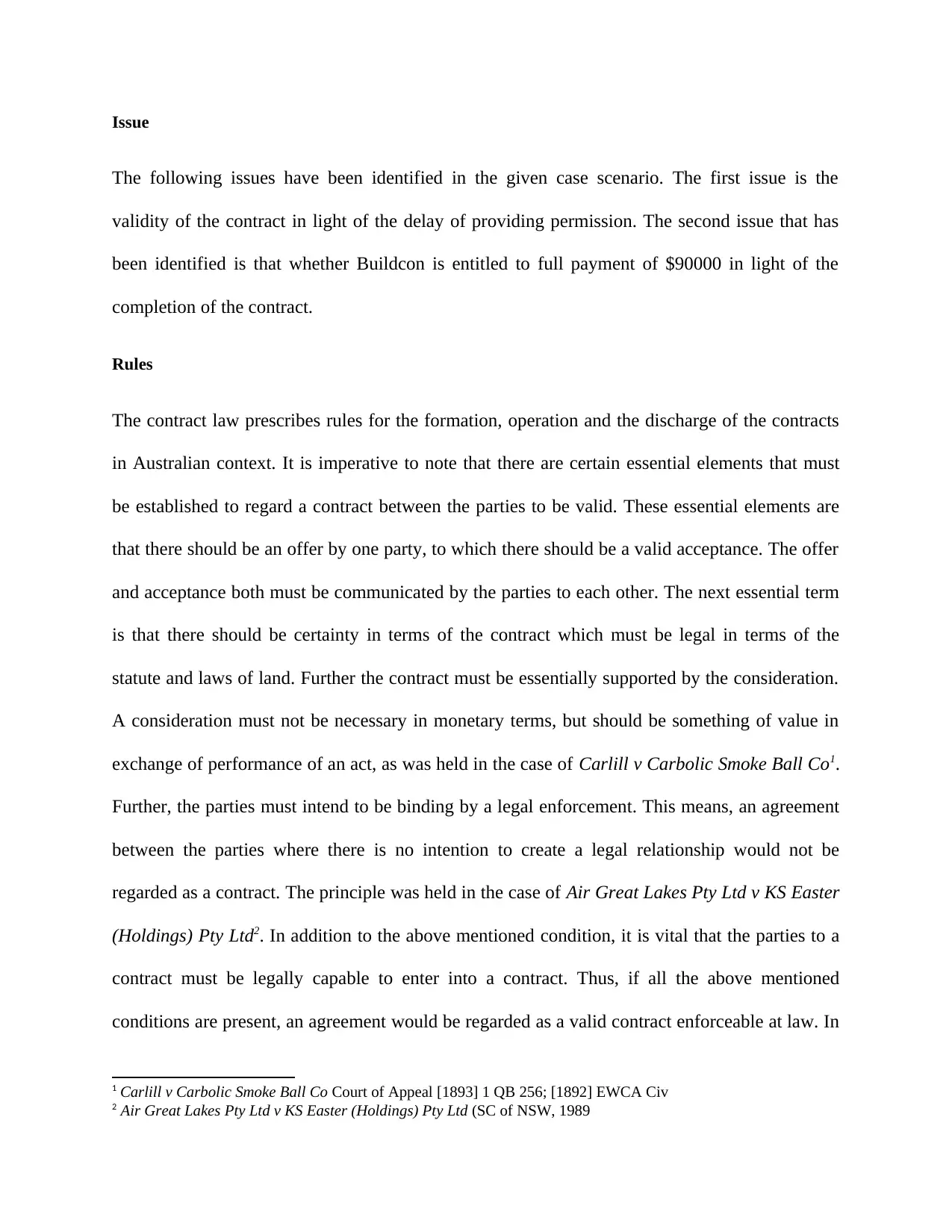
Issue
The following issues have been identified in the given case scenario. The first issue is the
validity of the contract in light of the delay of providing permission. The second issue that has
been identified is that whether Buildcon is entitled to full payment of $90000 in light of the
completion of the contract.
Rules
The contract law prescribes rules for the formation, operation and the discharge of the contracts
in Australian context. It is imperative to note that there are certain essential elements that must
be established to regard a contract between the parties to be valid. These essential elements are
that there should be an offer by one party, to which there should be a valid acceptance. The offer
and acceptance both must be communicated by the parties to each other. The next essential term
is that there should be certainty in terms of the contract which must be legal in terms of the
statute and laws of land. Further the contract must be essentially supported by the consideration.
A consideration must not be necessary in monetary terms, but should be something of value in
exchange of performance of an act, as was held in the case of Carlill v Carbolic Smoke Ball Co1.
Further, the parties must intend to be binding by a legal enforcement. This means, an agreement
between the parties where there is no intention to create a legal relationship would not be
regarded as a contract. The principle was held in the case of Air Great Lakes Pty Ltd v KS Easter
(Holdings) Pty Ltd2. In addition to the above mentioned condition, it is vital that the parties to a
contract must be legally capable to enter into a contract. Thus, if all the above mentioned
conditions are present, an agreement would be regarded as a valid contract enforceable at law. In
1 Carlill v Carbolic Smoke Ball Co Court of Appeal [1893] 1 QB 256; [1892] EWCA Civ
2 Air Great Lakes Pty Ltd v KS Easter (Holdings) Pty Ltd (SC of NSW, 1989
The following issues have been identified in the given case scenario. The first issue is the
validity of the contract in light of the delay of providing permission. The second issue that has
been identified is that whether Buildcon is entitled to full payment of $90000 in light of the
completion of the contract.
Rules
The contract law prescribes rules for the formation, operation and the discharge of the contracts
in Australian context. It is imperative to note that there are certain essential elements that must
be established to regard a contract between the parties to be valid. These essential elements are
that there should be an offer by one party, to which there should be a valid acceptance. The offer
and acceptance both must be communicated by the parties to each other. The next essential term
is that there should be certainty in terms of the contract which must be legal in terms of the
statute and laws of land. Further the contract must be essentially supported by the consideration.
A consideration must not be necessary in monetary terms, but should be something of value in
exchange of performance of an act, as was held in the case of Carlill v Carbolic Smoke Ball Co1.
Further, the parties must intend to be binding by a legal enforcement. This means, an agreement
between the parties where there is no intention to create a legal relationship would not be
regarded as a contract. The principle was held in the case of Air Great Lakes Pty Ltd v KS Easter
(Holdings) Pty Ltd2. In addition to the above mentioned condition, it is vital that the parties to a
contract must be legally capable to enter into a contract. Thus, if all the above mentioned
conditions are present, an agreement would be regarded as a valid contract enforceable at law. In
1 Carlill v Carbolic Smoke Ball Co Court of Appeal [1893] 1 QB 256; [1892] EWCA Civ
2 Air Great Lakes Pty Ltd v KS Easter (Holdings) Pty Ltd (SC of NSW, 1989
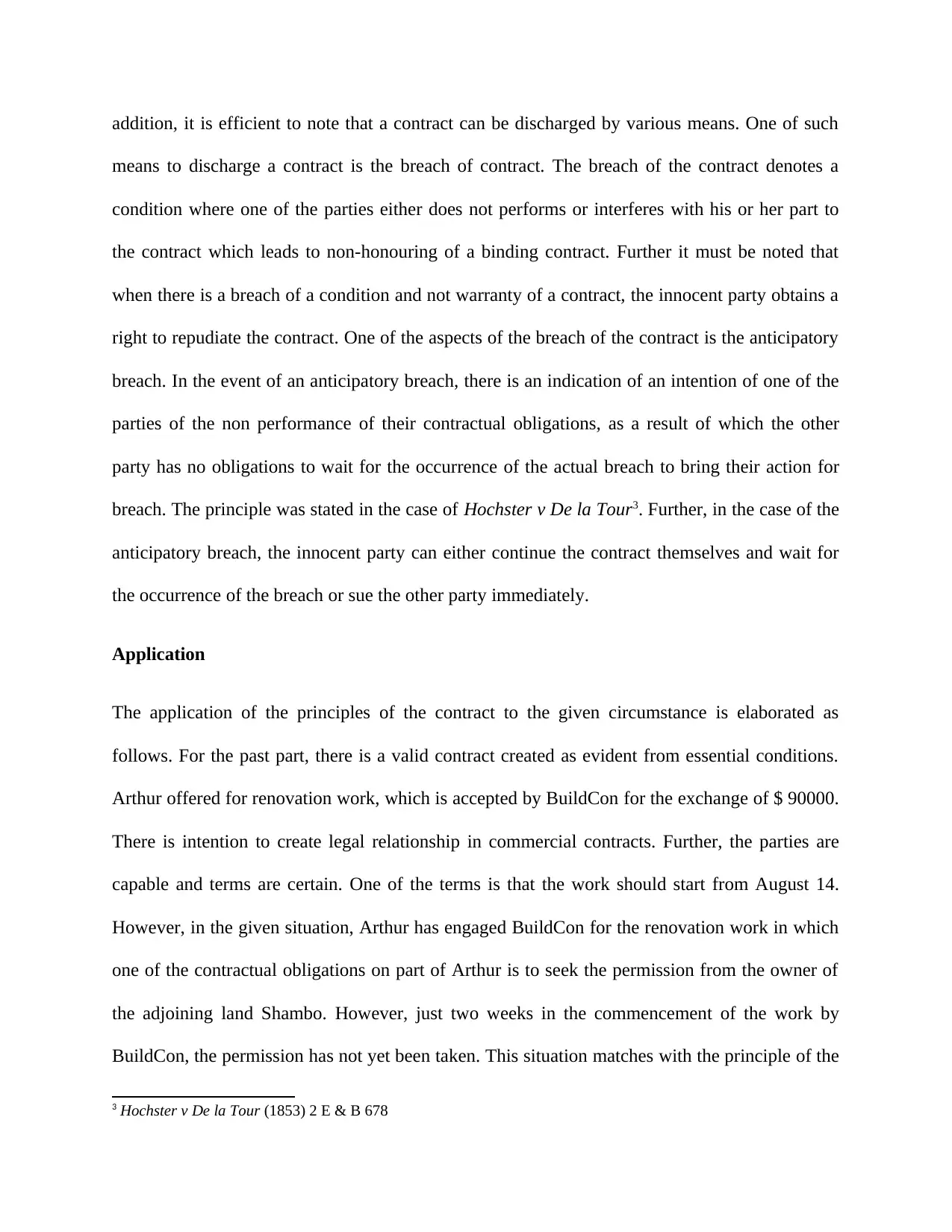
addition, it is efficient to note that a contract can be discharged by various means. One of such
means to discharge a contract is the breach of contract. The breach of the contract denotes a
condition where one of the parties either does not performs or interferes with his or her part to
the contract which leads to non-honouring of a binding contract. Further it must be noted that
when there is a breach of a condition and not warranty of a contract, the innocent party obtains a
right to repudiate the contract. One of the aspects of the breach of the contract is the anticipatory
breach. In the event of an anticipatory breach, there is an indication of an intention of one of the
parties of the non performance of their contractual obligations, as a result of which the other
party has no obligations to wait for the occurrence of the actual breach to bring their action for
breach. The principle was stated in the case of Hochster v De la Tour3. Further, in the case of the
anticipatory breach, the innocent party can either continue the contract themselves and wait for
the occurrence of the breach or sue the other party immediately.
Application
The application of the principles of the contract to the given circumstance is elaborated as
follows. For the past part, there is a valid contract created as evident from essential conditions.
Arthur offered for renovation work, which is accepted by BuildCon for the exchange of $ 90000.
There is intention to create legal relationship in commercial contracts. Further, the parties are
capable and terms are certain. One of the terms is that the work should start from August 14.
However, in the given situation, Arthur has engaged BuildCon for the renovation work in which
one of the contractual obligations on part of Arthur is to seek the permission from the owner of
the adjoining land Shambo. However, just two weeks in the commencement of the work by
BuildCon, the permission has not yet been taken. This situation matches with the principle of the
3 Hochster v De la Tour (1853) 2 E & B 678
means to discharge a contract is the breach of contract. The breach of the contract denotes a
condition where one of the parties either does not performs or interferes with his or her part to
the contract which leads to non-honouring of a binding contract. Further it must be noted that
when there is a breach of a condition and not warranty of a contract, the innocent party obtains a
right to repudiate the contract. One of the aspects of the breach of the contract is the anticipatory
breach. In the event of an anticipatory breach, there is an indication of an intention of one of the
parties of the non performance of their contractual obligations, as a result of which the other
party has no obligations to wait for the occurrence of the actual breach to bring their action for
breach. The principle was stated in the case of Hochster v De la Tour3. Further, in the case of the
anticipatory breach, the innocent party can either continue the contract themselves and wait for
the occurrence of the breach or sue the other party immediately.
Application
The application of the principles of the contract to the given circumstance is elaborated as
follows. For the past part, there is a valid contract created as evident from essential conditions.
Arthur offered for renovation work, which is accepted by BuildCon for the exchange of $ 90000.
There is intention to create legal relationship in commercial contracts. Further, the parties are
capable and terms are certain. One of the terms is that the work should start from August 14.
However, in the given situation, Arthur has engaged BuildCon for the renovation work in which
one of the contractual obligations on part of Arthur is to seek the permission from the owner of
the adjoining land Shambo. However, just two weeks in the commencement of the work by
BuildCon, the permission has not yet been taken. This situation matches with the principle of the
3 Hochster v De la Tour (1853) 2 E & B 678
⊘ This is a preview!⊘
Do you want full access?
Subscribe today to unlock all pages.

Trusted by 1+ million students worldwide
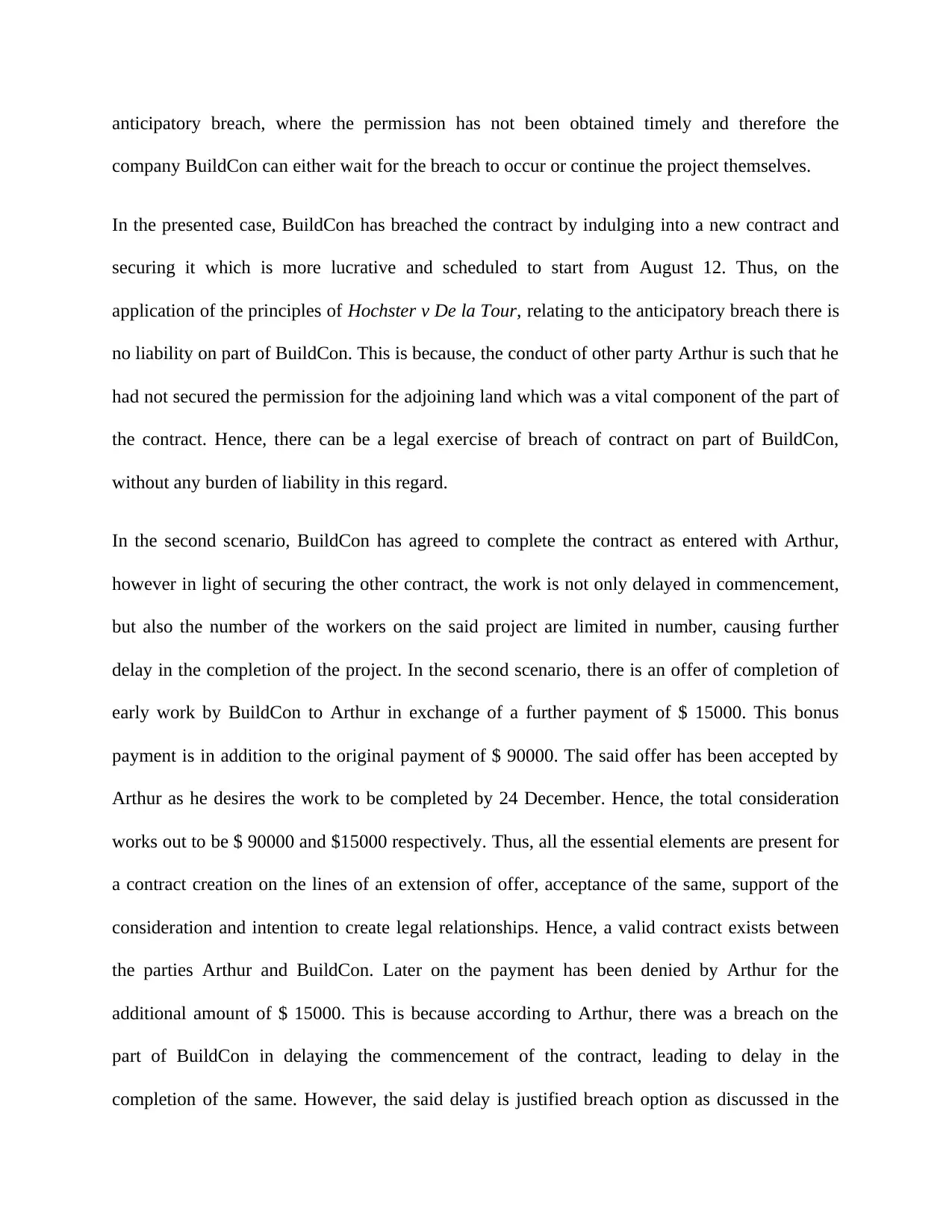
anticipatory breach, where the permission has not been obtained timely and therefore the
company BuildCon can either wait for the breach to occur or continue the project themselves.
In the presented case, BuildCon has breached the contract by indulging into a new contract and
securing it which is more lucrative and scheduled to start from August 12. Thus, on the
application of the principles of Hochster v De la Tour, relating to the anticipatory breach there is
no liability on part of BuildCon. This is because, the conduct of other party Arthur is such that he
had not secured the permission for the adjoining land which was a vital component of the part of
the contract. Hence, there can be a legal exercise of breach of contract on part of BuildCon,
without any burden of liability in this regard.
In the second scenario, BuildCon has agreed to complete the contract as entered with Arthur,
however in light of securing the other contract, the work is not only delayed in commencement,
but also the number of the workers on the said project are limited in number, causing further
delay in the completion of the project. In the second scenario, there is an offer of completion of
early work by BuildCon to Arthur in exchange of a further payment of $ 15000. This bonus
payment is in addition to the original payment of $ 90000. The said offer has been accepted by
Arthur as he desires the work to be completed by 24 December. Hence, the total consideration
works out to be $ 90000 and $15000 respectively. Thus, all the essential elements are present for
a contract creation on the lines of an extension of offer, acceptance of the same, support of the
consideration and intention to create legal relationships. Hence, a valid contract exists between
the parties Arthur and BuildCon. Later on the payment has been denied by Arthur for the
additional amount of $ 15000. This is because according to Arthur, there was a breach on the
part of BuildCon in delaying the commencement of the contract, leading to delay in the
completion of the same. However, the said delay is justified breach option as discussed in the
company BuildCon can either wait for the breach to occur or continue the project themselves.
In the presented case, BuildCon has breached the contract by indulging into a new contract and
securing it which is more lucrative and scheduled to start from August 12. Thus, on the
application of the principles of Hochster v De la Tour, relating to the anticipatory breach there is
no liability on part of BuildCon. This is because, the conduct of other party Arthur is such that he
had not secured the permission for the adjoining land which was a vital component of the part of
the contract. Hence, there can be a legal exercise of breach of contract on part of BuildCon,
without any burden of liability in this regard.
In the second scenario, BuildCon has agreed to complete the contract as entered with Arthur,
however in light of securing the other contract, the work is not only delayed in commencement,
but also the number of the workers on the said project are limited in number, causing further
delay in the completion of the project. In the second scenario, there is an offer of completion of
early work by BuildCon to Arthur in exchange of a further payment of $ 15000. This bonus
payment is in addition to the original payment of $ 90000. The said offer has been accepted by
Arthur as he desires the work to be completed by 24 December. Hence, the total consideration
works out to be $ 90000 and $15000 respectively. Thus, all the essential elements are present for
a contract creation on the lines of an extension of offer, acceptance of the same, support of the
consideration and intention to create legal relationships. Hence, a valid contract exists between
the parties Arthur and BuildCon. Later on the payment has been denied by Arthur for the
additional amount of $ 15000. This is because according to Arthur, there was a breach on the
part of BuildCon in delaying the commencement of the contract, leading to delay in the
completion of the same. However, the said delay is justified breach option as discussed in the
Paraphrase This Document
Need a fresh take? Get an instant paraphrase of this document with our AI Paraphraser
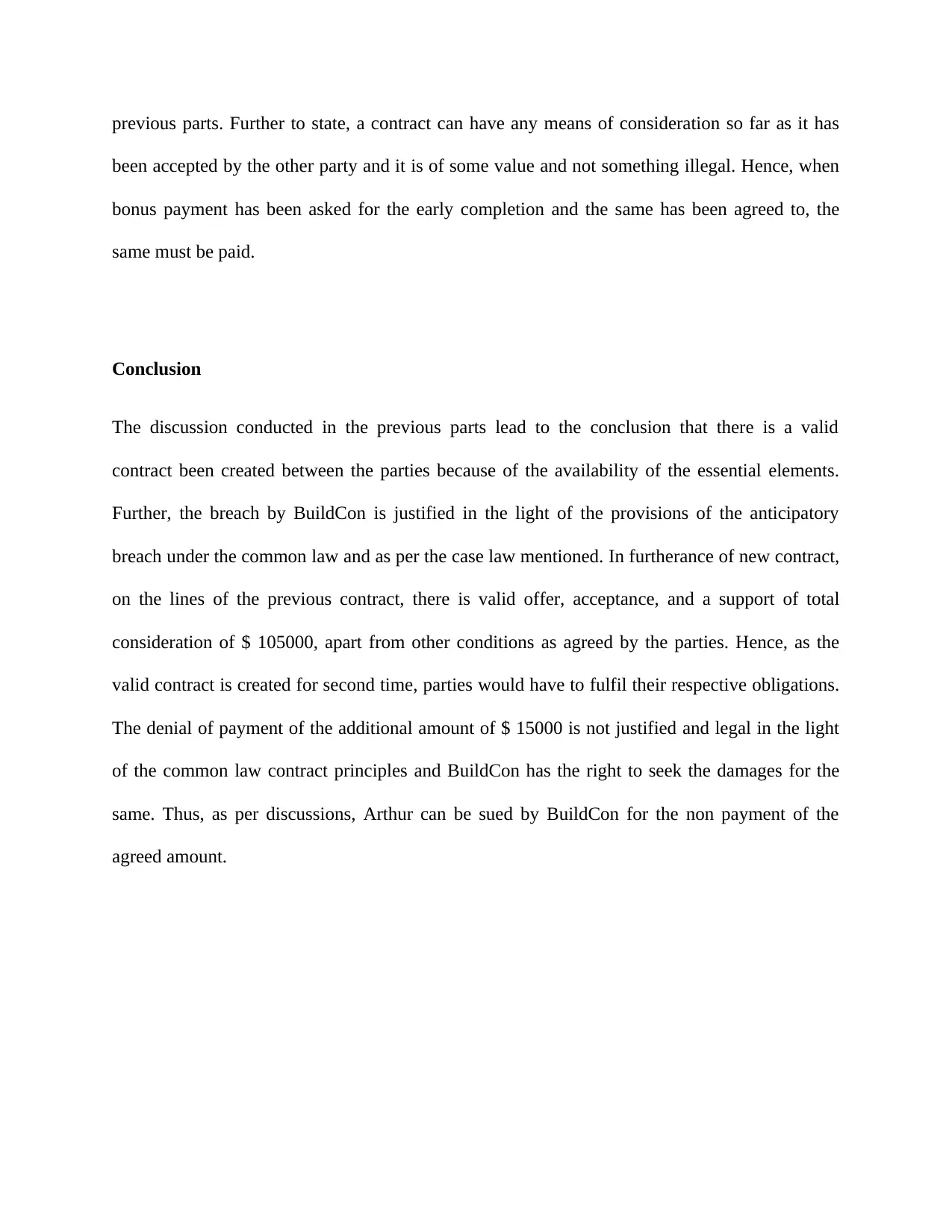
previous parts. Further to state, a contract can have any means of consideration so far as it has
been accepted by the other party and it is of some value and not something illegal. Hence, when
bonus payment has been asked for the early completion and the same has been agreed to, the
same must be paid.
Conclusion
The discussion conducted in the previous parts lead to the conclusion that there is a valid
contract been created between the parties because of the availability of the essential elements.
Further, the breach by BuildCon is justified in the light of the provisions of the anticipatory
breach under the common law and as per the case law mentioned. In furtherance of new contract,
on the lines of the previous contract, there is valid offer, acceptance, and a support of total
consideration of $ 105000, apart from other conditions as agreed by the parties. Hence, as the
valid contract is created for second time, parties would have to fulfil their respective obligations.
The denial of payment of the additional amount of $ 15000 is not justified and legal in the light
of the common law contract principles and BuildCon has the right to seek the damages for the
same. Thus, as per discussions, Arthur can be sued by BuildCon for the non payment of the
agreed amount.
been accepted by the other party and it is of some value and not something illegal. Hence, when
bonus payment has been asked for the early completion and the same has been agreed to, the
same must be paid.
Conclusion
The discussion conducted in the previous parts lead to the conclusion that there is a valid
contract been created between the parties because of the availability of the essential elements.
Further, the breach by BuildCon is justified in the light of the provisions of the anticipatory
breach under the common law and as per the case law mentioned. In furtherance of new contract,
on the lines of the previous contract, there is valid offer, acceptance, and a support of total
consideration of $ 105000, apart from other conditions as agreed by the parties. Hence, as the
valid contract is created for second time, parties would have to fulfil their respective obligations.
The denial of payment of the additional amount of $ 15000 is not justified and legal in the light
of the common law contract principles and BuildCon has the right to seek the damages for the
same. Thus, as per discussions, Arthur can be sued by BuildCon for the non payment of the
agreed amount.

Bibliography
Air Great Lakes Pty Ltd v KS Easter (Holdings) Pty Ltd (SC of NSW, 1989
Carlill v Carbolic Smoke Ball Co Court of Appeal [1893] 1 QB 256; [1892] EWCA Civ
Hochster v De la Tour (1853) 2 E & B 678
Air Great Lakes Pty Ltd v KS Easter (Holdings) Pty Ltd (SC of NSW, 1989
Carlill v Carbolic Smoke Ball Co Court of Appeal [1893] 1 QB 256; [1892] EWCA Civ
Hochster v De la Tour (1853) 2 E & B 678
⊘ This is a preview!⊘
Do you want full access?
Subscribe today to unlock all pages.

Trusted by 1+ million students worldwide
1 out of 6
Related Documents
Your All-in-One AI-Powered Toolkit for Academic Success.
+13062052269
info@desklib.com
Available 24*7 on WhatsApp / Email
![[object Object]](/_next/static/media/star-bottom.7253800d.svg)
Unlock your academic potential
Copyright © 2020–2026 A2Z Services. All Rights Reserved. Developed and managed by ZUCOL.




